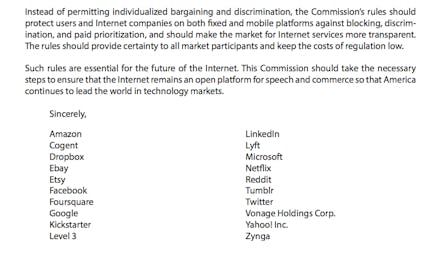Facebook, Netflix and 100 Other Tech Companies Just Sent This Powerful Letter to the Government

The news: Politicians might not understand the finer points of net neutrality, but they have heard of Facebook, Google and Microsoft.
That's why more than 100 of the biggest tech companies in the world banded together on Wednesday to send a letter to the Federal Communications Commission. The agency is currently debating net neutrality regulations, which many fear will allow Internet service providers (ISPs) to arbitrarily hike up their prices. Theoretically, these telecoms would be able to offer a tiered service to websites, charging them more money for faster service.
The letter reads:
While that's certainly bad news for startups that are attempting to break out, big, established companies are not happy about it either. The FCC letter — signed by the who's who of Silicon Valley, including Amazon, Ebay, Netflix, Reddit and Yahoo — made clear that the tech world will not accept rules that would "enable phone and cable Internet service providers to discriminate both technically and financially."
"Instead of permitting individualized bargaining and discrimination, the commission's rules should protect users and Internet companies on both fixed and mobile platforms against blocking, discrimination and paid prioritization, and should make the market for Internet services more transparent," the letter continued.
Why this is important: This might just sound like a pissing match between powerful companies (Internet content providers versus service providers) but there are real ramifications for the average consumer. If these proposed regulations pass, ISPs would essentially have the right to control what content makes it to the American public, and at what price.
Companies have already begun to pony up more money so their content can be streamed faster, and those costs are being transferred to the consumer. Case in point: Netflix.
The streaming video giant has been vocally calling for net neutrality, but has already caved in to Comcast and Verizon's demands to pay more for faster service. Last month the company announced that it will begin raising its subscription prices, forcing customers to absorb its costs.
Verizon customers suffered from extremely poor connection quality to Netflix before the latter agreed to pony up the cash:
And consumers are not happy. According to a recent survey by Consumer Reports, 71% of Internet users said they would switch to another service provider if their ISP violated network neutrality, with a full 10% saying they would be willing to quit the Internet altogether. There's no knowing whether people would actually honor their threats, but these numbers should give any ISP some pause.
What will happen next? The FCC is holding a vote on the proposal on May 15, but there is already dissent among the ranks. Though FCC chairman Tom Wheeler has indicated his support for the measure, the panel's two Republicans oppose it, and the Democrats are not fully supportive either. "I can tell you right now I have real concerns about process," said Democratic commissioner Jessica Rosenworcel, calling to delay the vote by a month. "Rushing headlong into a rulemaking next week fails to respect the public response to his proposal."
In the meantime, the Silicon Valley letter is contributing some much-needed pressure. Though a letter might not seem like the most dramatic form of protest, it shows that these huge tech companies are presenting a united front. After all, it was the coordinated Internet blackout that doomed SOPA/PIPA legislation. A similarly joint effort in support of net neutrality might really make a difference at the Hill.